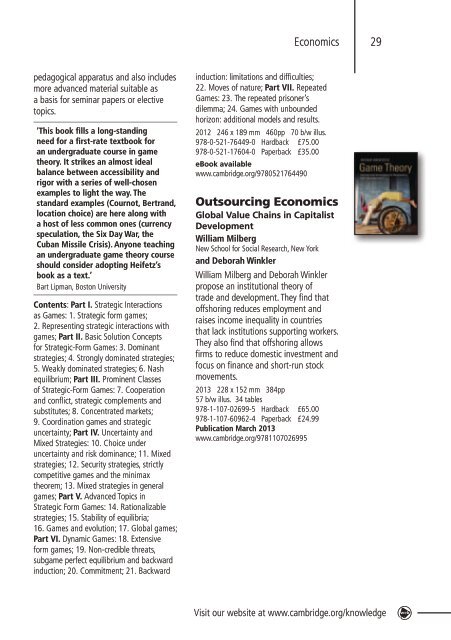Business and Management 2013 - Cambridge University Press India
Business and Management 2013 - Cambridge University Press India
Business and Management 2013 - Cambridge University Press India
- No tags were found...
Create successful ePaper yourself
Turn your PDF publications into a flip-book with our unique Google optimized e-Paper software.
Economics 29pedagogical apparatus <strong>and</strong> also includesmore advanced material suitable asa basis for seminar papers or electivetopics.‘This book fills a long-st<strong>and</strong>ingneed for a first-rate textbook foran undergraduate course in gametheory. It strikes an almost idealbalance between accessibility <strong>and</strong>rigor with a series of well-chosenexamples to light the way. Thest<strong>and</strong>ard examples (Cournot, Bertr<strong>and</strong>,location choice) are here along witha host of less common ones (currencyspeculation, the Six Day War, theCuban Missile Crisis). Anyone teachingan undergraduate game theory courseshould consider adopting Heifetz’sbook as a text.’Bart Lipman, Boston <strong>University</strong>Contents: Part I. Strategic Interactionsas Games: 1. Strategic form games;2. Representing strategic interactions withgames; Part II. Basic Solution Conceptsfor Strategic-Form Games: 3. Dominantstrategies; 4. Strongly dominated strategies;5. Weakly dominated strategies; 6. Nashequilibrium; Part III. Prominent Classesof Strategic-Form Games: 7. Cooperation<strong>and</strong> conflict, strategic complements <strong>and</strong>substitutes; 8. Concentrated markets;9. Coordination games <strong>and</strong> strategicuncertainty; Part IV. Uncertainty <strong>and</strong>Mixed Strategies: 10. Choice underuncertainty <strong>and</strong> risk dominance; 11. Mixedstrategies; 12. Security strategies, strictlycompetitive games <strong>and</strong> the minimaxtheorem; 13. Mixed strategies in generalgames; Part V. Advanced Topics inStrategic Form Games: 14. Rationalizablestrategies; 15. Stability of equilibria;16. Games <strong>and</strong> evolution; 17. Global games;Part VI. Dynamic Games: 18. Extensiveform games; 19. Non-credible threats,subgame perfect equilibrium <strong>and</strong> backwardinduction; 20. Commitment; 21. Backwardinduction: limitations <strong>and</strong> difficulties;22. Moves of nature; Part VII. RepeatedGames: 23. The repeated prisoner’sdilemma; 24. Games with unboundedhorizon: additional models <strong>and</strong> results.2012 246 x 189 mm 460pp 70 b/w illus.978-0-521-76449-0 Hardback £75.00978-0-521-17604-0 Paperback £35.00eBook availablewww.cambridge.org/9780521764490Outsourcing EconomicsGlobal Value Chains in CapitalistDevelopmentWilliam MilbergNew School for Social Research, New York<strong>and</strong> Deborah WinklerWilliam Milberg <strong>and</strong> Deborah Winklerpropose an institutional theory oftrade <strong>and</strong> development. They find thatoffshoring reduces employment <strong>and</strong>raises income inequality in countriesthat lack institutions supporting workers.They also find that offshoring allowsfirms to reduce domestic investment <strong>and</strong>focus on finance <strong>and</strong> short-run stockmovements.<strong>2013</strong> 228 x 152 mm 384pp57 b/w illus. 34 tables978-1-107-02699-5 Hardback £65.00978-1-107-60962-4 Paperback £24.99Publication March <strong>2013</strong>www.cambridge.org/9781107026995Visit our website at www.cambridge.org/knowledge
















